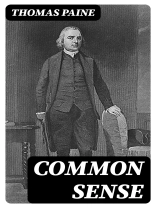In ‘Common Sense, ‘ published in 1776, Thomas Paine delivers a fervent and impassioned argument advocating for American independence from British rule. Written in accessible language, the pamphlet employs persuasive rhetoric that resonates with the common citizen, stripping away the complex legal jargon of the time. Paine deftly intertwines philosophy and politics, critiquing monarchy and hereditary succession while championing the principles of democracy and self-governance. By situating his work within the context of Enlightenment thought, he inspires a nascent revolutionary spirit among readers, elucidating the moral imperative for independence in the face of tyranny. Paine, a political theorist and revolutionary, was born in England but found his purpose in America, perhaps motivated by his experiences with oppression and his conviction for human rights. His writings reflect a grassroots understanding of societal structures, as he eloquently articulates the struggles of the common man against the elitist power of monarchy. His unique position as an outsider informed his critical insights, making ‘Common Sense’ not only a call to action but also a defining manifesto for American political thought. This seminal work remains a crucial read for anyone interested in the foundations of democracy and the revolutionary ideals that shaped the United States. Paine’s clear, direct style makes complex ideas accessible, captivating a broad audience. ‘Common Sense’ is essential for understanding both the historical context of the American Revolution and the enduring principles of freedom and equality.
Despre autor
Thomas Paine (1737–1809) was a prominent figure in the realms of political theory and philosophy whose contributions to political and social thought have earned him a respected place in the annals of history. Born in Thetford, Norfolk in England, Paine emigrated to the American colonies in 1774, where he became an influential voice in the American Revolution. His pamphlet, ‘Common Sense, ‘ published in 1776, captivated colonial America and played a pivotal role in galvanizing public opinion in favor of independence from Britain. The pamphlet is celebrated for its accessible prose, its cogent arguments against monarchical rule, and its fiery advocacy for a new, democratic form of government. Paine’s eloquence and persuasive literary style made complex ideas comprehensible to the general populace. This clarity of expression coupled with incisive political insight marked a defining characteristic of his work. Beyond ‘Common Sense, ‘ Paine’s corpus includes ‘The American Crisis, ‘ a series of pamphlets that bolstered American morale during the Revolution, and later, ‘Rights of Man’ and ‘The Age of Reason, ‘ both of which cemented his reputation as a champion of enlightenment thinking and human rights. Despite facing personal and political backlash for his forthright views, Paine’s legacy endures through his significant contributions to the literature of liberty and democratic governance.












